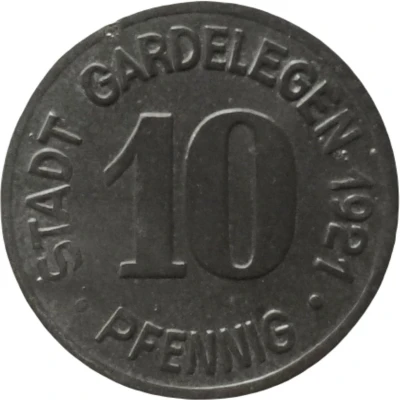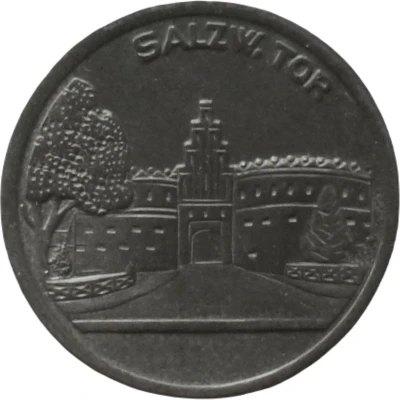


© Willem63 (CC BY-NC-SA)
10 Pfennigs - Gardelegen
1921 year| Iron | 3.7 g | 21.0 mm |
| Issuer | City of Gardelegen (Prussian province of Saxony) |
|---|---|
| Period | Weimar Republic (1918-1933) |
| Type | Standard circulation coin |
| Year | 1921 |
| Value | 10 Pfennigs (10 Pfennige) (0.10) |
| Currency | Mark (1914-1924) |
| Composition | Iron |
| Weight | 3.7 g |
| Diameter | 21.0 mm |
| Thickness | 1.6 mm |
| Shape | Round |
| Technique | Milled |
| Orientation | Medal alignment ↑↑ |
| Demonetized | Yes |
| Updated | 2024-10-04 |
| Numista | N#100473 |
|---|---|
| Rarity index | 83% |
Reverse
Image of Salzwedeler Tor
Script: Latin
Lettering: SALW. TOR
Edge
Plain
Comment
Issuing authority: [Stadt, Provinz Sachsen]Interesting fact
The 10 Pfennigs - Gardelegen 1921 coin was issued during a time of hyperinflation in Germany, specifically during the period known as the "Inflationary Era" (1914-1924). During this time, the value of the German mark (the national currency) plummeted, and prices for everyday goods skyrocketed. As a result, many Germans turned to alternative forms of currency, such as local emergency currencies like the 10 Pfennigs - Gardelegen 1921 coin, which was issued by the City of Gardelegen in the Prussian province of Saxony. Despite being made of iron and having a relatively low face value, the coin is now a highly sought-after collector's item due to its historical significance and rarity.